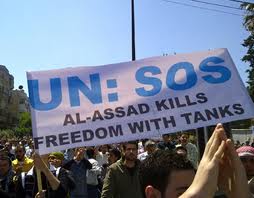 The Syrian regime marked the first day of the holy month of Ramadan with more strikes on restive towns, raising pressure for international action and provoking accusations of a sectarian war against the country’s majority Sunni Arab population.
The Syrian regime marked the first day of the holy month of Ramadan with more strikes on restive towns, raising pressure for international action and provoking accusations of a sectarian war against the country’s majority Sunni Arab population.
Security forces pursued their bombardment of the city of Hama, where at least 80 people were killed on Sunday, with the crackdown also continuing in the eastern oil-producing town of Deir Ezzor and reaching Al Bukamal near the Iraqi border, according to activists.
The town of Zabadani, a protest hotspot close to Damascus, was reported to be under military siege. At least eight people were estimated to have been killed in Monday’s violence.
As world powers prepared for a meeting of the UN Security Council, where Russia has so far blocked condemnation of its ally in Damascus, the European Union added five new names to its list of Syrian officials subject to asset freezes and travel bans.
Even Moscow warned the Syrian regime on Monday against the use of force on civilians. In Turkey, an increasingly frustrated ally of Syria, President Abdullah Gul said the images from Hama on Sunday had “horrified us”.
Protesters in Hama, site of a 1982 massacre by President Bashar al-Assad’s father that residents thought would never be repeated, remained defiant however.
For the past month the city had been left alone by security forces, staging some of the largest peaceful demonstrations in the four-and-a-half-month uprising and undermining the regime’s narrative that it is fighting armed gangs.
As Ramadan dawned across Syria on Monday, the military moved in to position for another attack on Hama.
“This morning at 7.30 suddenly the city was bombed,” said Omar Habbal, an activist. “It was a very big bombardment which continued for 20-25 minutes.”
According to Mr Habbal, many of the city’s barricades, taken down by security forces on Sunday, have been rebuilt.
“We won’t give up because we have got a very big lesson from [the southern province of] Deraa, where they [the regime] took the boys and killed them and took them to mass graves.”
With a youth-led protest movement defying the regime’s crackdown, Mr Assad has apparently decided on a major assault to regain the initiative and crush activists’ plans to step up their popular campaign during Ramadan, when people congregate in mosques for evening prayers, a usual point of departure for many demonstrations.
Activists have also been encouraging protests during Ramadan in Damascus and Aleppo, the two major cities that have so far remained largely outside the protest movement.
In a letter to the army, Mr Assad repeated the regime’s claim that Syria was facing a foreign conspiracy designed to sow sectarian strife and “tear Syria into small statelets that compete to satisfy those who worked to slice them up”.
Opposition activists, however, say it is the regime, dominated by the Alawite minority in a majority Sunni country, that has been deliberately stoking sectarian tensions to maintain the loyalty of minorities and raise the spectre of civil chaos.
Arab television stations have been broadcasting the unforgettable spectacle of mosque minarets with clouds of smoke over them in the conservative Sunni city of Hama on the eve of the holy month of fasting.
The Muslim Brotherhood, whose Syrian branch, which is banned inside the country has hitherto been very careful not to play up the sectarian aspect of the crackdown, issued a statement saying Syria was witnessing “a war of sectarian cleansing”.
“The regime has linked its open annihilation with the crescent of Ramadan. It is a war on the identity and beliefs of the Syrian nation . . . on Arab Muslim Syria,” said the Brotherhood statement, reported by Reuters news agency.
Activists and analysts believe the escalating crackdown will prove counterproductive, just as previous attacks on other cities injected new momentum into the uprising.
“It an act of frustration and despair,” said Hilal Khashan, a professor of political science at the American University of Beirut. “[Assad] knows it will backfire.”
Wissam Tarif, a human rights activist based outside of Syria, said the question was whether the regime was willing to kill many more people to disrupt the protests, especially in Hama. In Ramadan, says Mr Tarif “every casualty will be emphasised – that’s what the protesters are betting on”.

Leave a Reply
You must be logged in to post a comment.